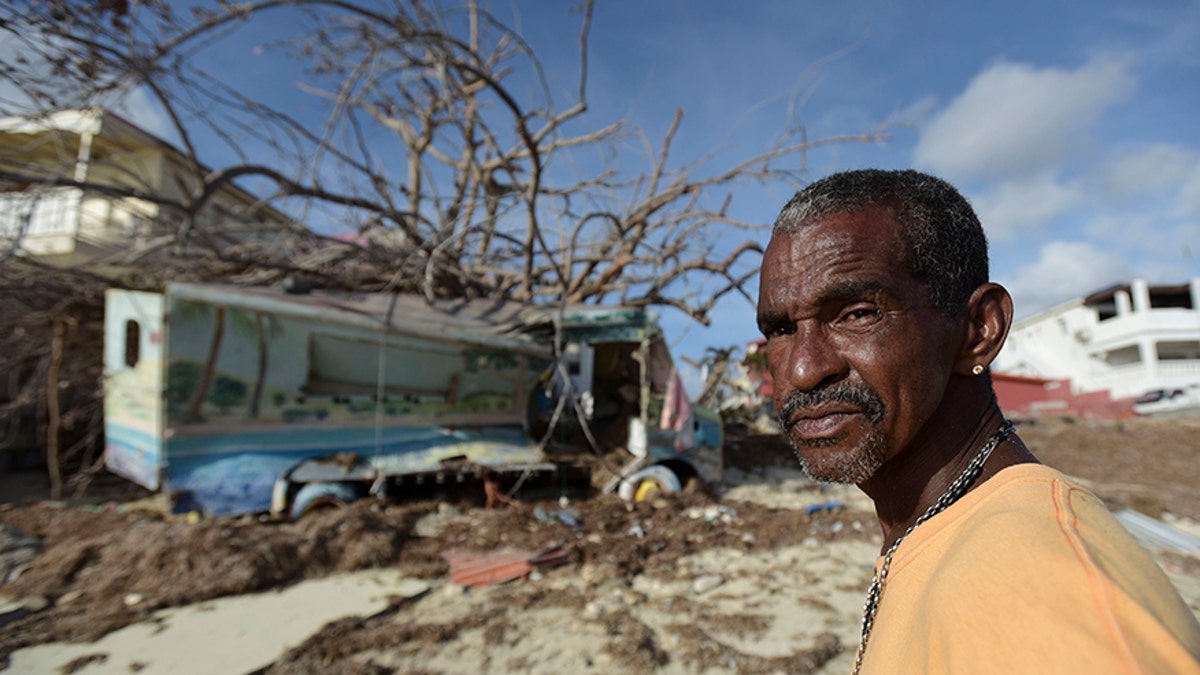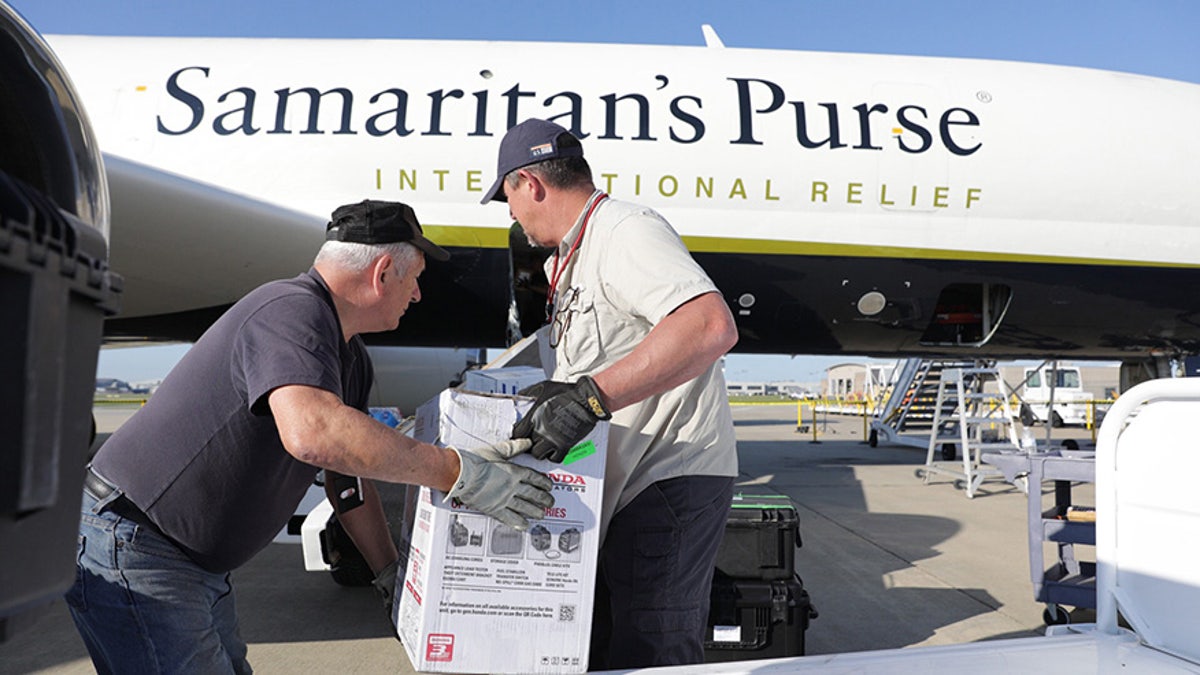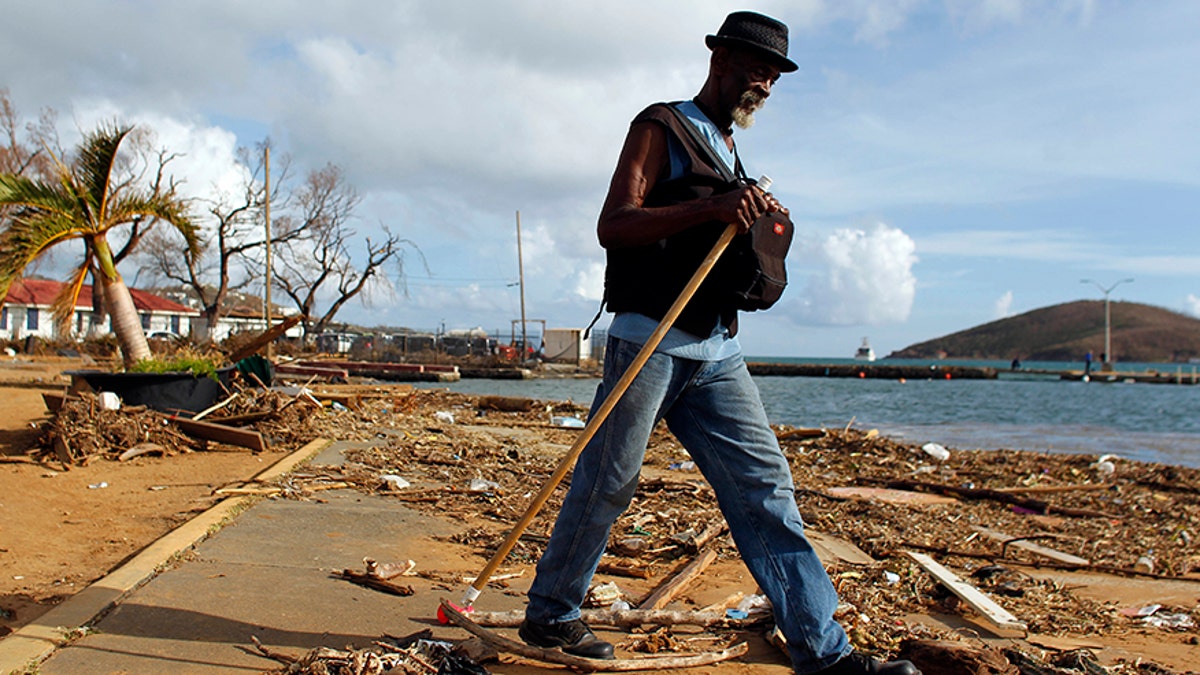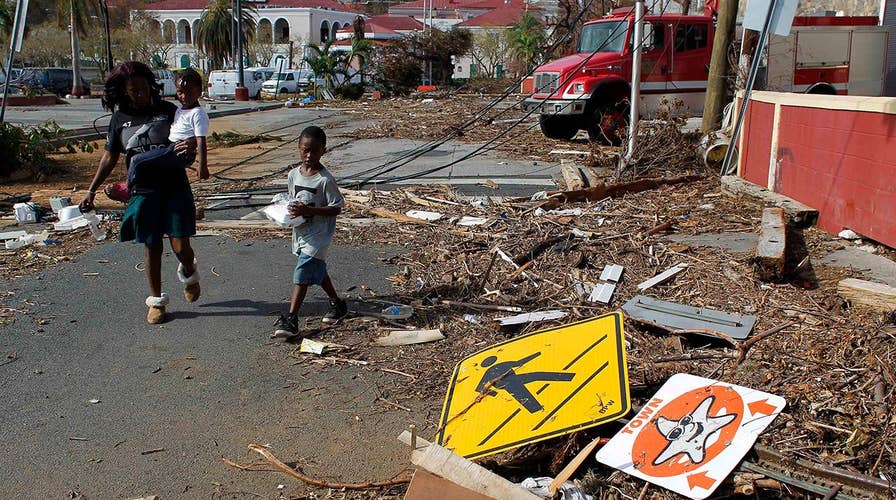Devastated Virgin Islands begins long road to recovery
Virgin Islands Relief Inc.'s Matt Atkinson details biggest needs after Hurricane Irma
St. John, once dubbed the jewel of the Caribbean, was left looking like a devastated wasteland after Hurricane Irma ripped through it. The storm also destroy 90 percent of St. Martin and left the once glamorous and exclusive resort town of St. Barts a tattered mess.
But the survivors left behind on the Caribbean islands ravaged by Hurricane Irma say they will rebuild and the islands will be stronger than ever. But first, they say, they need help – and fast.

Juan Antonio Higuey shows his destroyed home at Cold Bay community after the passage of Hurricane Irma, in St. Martin. (AP)
Islanders across the northern Caribbean are in desperate need of food, water, power and other basic necessities on the road back to normalcy. Thousands remain without power and communication with those off the islands are shoddy, at best.
“It’s been a mess,” Bryan Barnes, chief of the St. John Rescue on the U.S. Virgin Island of St. John, told Fox News on Thursday. “There wasn’t a house that wasn’t impacted.”
Irma bullied through much of the Caribbean — Antigua, St. Martin, St. Barts, Anguilla, the U.S. and British Virgin Islands, Turks and Caicos, the Bahamas. It narrowly skirted Puerto Rico, Haiti, and the Dominican Republic. It turned lush tropical playgrounds into blasted-out landscapes, littered with splintered lumber, crumpled sheet metal, and shattered lives.
“We cannot let Irma’s victims in the Caribbean be forgotten. The real work is just beginning.”
In St. Martin – which is divided into the French Saint-Martin and the Dutch Sint Maarten – the Dutch Red Cross said more than 90 percent of buildings were damaged and a third were destroyed by Irma’s fierce winds and powerful storm surge. Fifteen people on the tiny island were killed.
“The island has been leveled by the hurricane,” Kaitlyn Lahm, a spokesperson for Samaritan’s Purse, an evangelical Christian international relief organization based in North Carolina, told Fox News on Thursday. “There is a huge need.”

After Hurricane Irma’s destructive path across the Caribbean, Samaritan’s Purse sends its DC-8 aircraft to St. Maarten, with 20 tons of supplies including hygiene items, blankets and rolls of heavy-duty plastic sheeting for emergency shelter. (Courtesy of Samaritan’s Purse)
In the U.S. Virgin Islands, the damage was particularly widespread on St. John, an island of stunning natural beauty that is mostly a national park surrounded by coral reefs.
"You could see there was not much left," Larry Brown, a part-time resident, said as he waited in Puerto Rico for a flight back to his southwestern Florida home to see what damages awaited him there. "It was just horrible."
Some relief has come at the hands of the U.S. and European governments, which deployed military and emergency personnel in the days following the unprecedented Category 5 storm.
To the U.S. Virgin Islands, FEMA said Thursday that nearly 578,000 meals, 383,000 liters of water, 13,600 sheeting covers, 150 rolls of blue tarps and 30 generators were sent to the Caribbean island. President Trump is expected to visit the islands next week to assess the damage.
Barnes praised the response that the U.S. federal government has offered, but said the islands need more help than what the government can provide.
“The best thing that people can do is to donate,” he said from St. John, adding that the plan right now is to make sure people are safe and getting the basic need. “(In the U.S.), if there is a tornado right now, there is destruction but you can drive 20 minutes down the road and get the materials you need. Here we are so isolated that it’s difficult to get stuff in.”
Andria Mitsakos, a spokesperson for Sonesta Resorts in St. Maarten, which has set up a GoFundMe page to help its employees, said it’s a critical time for help.
“We cannot let Irma’s victims in the Caribbean be forgotten,” the spokesperson said. “The real work is just beginning.”

A man walks past debris caused by Hurricane Irma in Charlotte Amalie, St. Thomas, U.S. Virgin Islands, Sunday, Sept. 10, 2017. The storm ravaged such lush resort islands as St. Martin, St. Barts, St. Thomas, Barbuda and Anguilla. (AP Photo/Ricardo Arduengo) (Copyright 2017 The Associated Press. All rights reserved.)
William Marlin, prime minister of Sint Maarten, vowed his island – and the Caribbean – would overcome and prosper after the devastation.
“While some may think that the obvious beauty of our nation has been lost in the destruction; I insist that you are the beauty – the power of our people, and the power of collaboration and kindness – and together, we are all the hope for a new tomorrow,” he said in a statement on Friday, adding: “Our neighbors are showing their humanity too. After all, we are all the Caribbean. We are one.”
Additional relief is coming from organizations like Samaritan’s Purse, which has transported more than 85 tons of emergency supplies including food, hygiene kits, shelter materials, and water filtration systems that turn sea water into drinking water.
Lahm said the organization is currently focusing its efforts on two islands, Barbuda and Sint Maarten, but expects to expand to other Caribbean islands in the coming weeks. The group also has teams working in Florida and Texas, which were both hard hit by hurricanes the past few weeks.
Frank Comito, chief executive officer of the Caribbean Hotel and Tourism Association, said immediate relief is key for the islands’ survival but donations will also help them fully recover.
“In a couple of weeks people are going to forget about these people so we have to think about how we can help the industry in the long run,” he said. “Everything will come out stronger [after this]. Our people are incredibly resilient.”
He praised the “unsung” heroes in the hotels who stayed on while the storm passed to make sure stranded visitors to the islands were safe.
“It speaks volumes of the hospitality industry in the region,” Comito said, adding that the heroes have been getting less news coverage than the looters. “[And] they are overshadowed by small groups of hooligans.”
In addition to donations, Comito said people should also continue to visit other Caribbean destinations that are open for business as it will boost the region overall.
“About 70 percent of the Caribbean,” he said, “was not impacted at all and it’s open for business.”
The Associated Press contributed to this report.




















